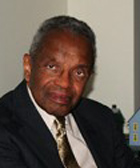Constitutional scholar Derrick Bell will present the first program in a full schedule for the Assembly Series’ 2008 spring semester. Among the Series’ speakers are scientists, legal scholars, writers and sex experts, plus a concert performed by the St. Louis Symphony.

On Jan. 25, the 13th Chancellor’s Fellowship Conference will feature Derrick Bell on “Love’s Labor Lost: Racial Reform’s Realities.” The talk will be at 11 a.m. in Graham Chapel, with a panel discussion beginning at 2 p.m. in the Women’s Building Lounge. Both events are free and open to the public.
Known for his theories on race that transcend the normal boundaries of liberal and conservative perspectives, Bell has championed the cause for civil rights and diversity in the workplace throughout his career. As the first tenured African-American professor at Harvard University, he resigned on principle after determining that the institution was not trying hard enough to recruit minority female faculty. In many of his 10 published books, Bell explores the nature of discrimination and power and examines racial issues within the context of their economic, social and political dimensions.
As a young civil rights attorney during the 1960s, Bell worked with many prominent African-American lawyers including Thurgood Marshall. In 1969, he joined the Harvard Law School faculty. In 1980, he became dean the University of Oregon School of Law but left after five years to protest what he considered a discriminatory move to block the hiring of a deserving Asian-American female.
Back at Harvard, Bell watched as other prestigious law schools hired women of color, but not his institution. In 1990, he took an unpaid leave of absence with the intention of staying away until Harvard hired minority women. After two years with no sign of progress, he resigned from Harvard and joined the law faculty at New York University as a visiting professor.
Bell received a bachelor’s degree from Duquesne University in 1952 and a law degree from the University of Pittsburgh in 1957.
The Assembly Series schedule through March 19 follows. The remaining spring schedule will be in next week’s Record.
St. Louis Symphony Concert
7:30 p.m., Feb. 4, May Auditorium, Simon Hall
Two modern compositions will be performed by members of the renowned orchestra and conducted by David Robertson. The first is “Voice of the Whale” composed by George Crumb, and the second “Different Trains” by Steve Reich.
George Whitesides
11 a.m. Feb. 6, Graham Chapel
“Questions about Questioons about the Origin of Life”
One of the most pre-eminent chemists working today, Whitesides’ achievements have led to significant breakthroughs and developments in academia, business and government. He holds more than 50 patents and helped found several biotechnology businesses.
Fatemeh Keshavarz
11 a.m., Feb. 13, Graham Chapel
“Jasmine and Stars: Reading More Than Lolita in Tehran”
In her recent book, “Jasmine and Stars,” the Iranian-born poet and professor breaks through pervasive Western stereotypes of Iranians to show the vitality that exists in her homeland. Keshavarz teaches Persian and comparative literature and chairs WUSTL’s Department of Asian and Near Eastern Languages & Literatures.
Drew Pinsky
6 p.m., Feb. 15, location to be announced
“Loveline with Dr. Drew”
As Dr. Drew from his nationally-syndicated radio talk show, “Loveline,” the popular advice columnist helps guide young Americans through the complications of love, sex and relationships. As a practicing physician, he sees a great need for helping young people form stable and healthy relationships.
Philip Clayton
4:30 p.m., March 5, Whitaker Hall Auditorium
“From Quantum to Consciousness: Does Emergence Support the Language of Spirit?”
Theologian Clayton works at the intersection of science, modern philosophy, metaphysics and religion. Recently, he has employed the new paradigm of emergence as a way to discuss concepts such as spirituality, human freedom and moral responsibility.
Jocelyn Bell Burnell
11 a.m., March 19, Graham Chapel
In the late 1960s, the then-Cambridge University graduate student was instrumental in discovering the existence of pulsars, which introduced a new branch of astrophysics. Throughout her career, Bell Burnell has been a champion for women in the sciences.
For more information, visit assemblyseries.wustl.edu or call 935-5285.